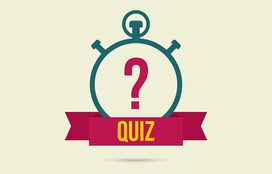 By way of a change, which some people think is as good as a rest, this week’s blog takes the form of a quiz. It’s literary based, so the better read amongst you will stand the best chance of getting the answers right. Firstly, I’d better manage your expectations.
FAQs Q. What do I get for winning? A. A warm glow for being right. So, all you get for your trouble is the nice warm feeling of being right. By all means post your score in the comments section if you want to show off – but there’s still no prize for the highest score.  Cheat if you want to and look up the answers, but you’ll gain nothing from it and you’ll lose your self-respect for having cheated. There are 10 questions, some of which are worth more points than others and there are also also bonus points available for some questions. All the answers may be found at the end. So, let’s get started. 1. Which literary figure once said of the Dickens novel “The Old Curiosity Shop” “One must have a heart of stone to read the death of Little Nell without laughing.” (2 points)  Yes, It's J K Rowling, but under what other name does she write? Yes, It's J K Rowling, but under what other name does she write? 2. What pseudonym does J K Rowling use to write her Cormoran Strike detective series? (1 point) 3. In what country is the C S Forester book “The African Queen” set? (2 points) 4. In the Nevil Shute book “A Town Like Alice” who, or what, is Alice? (1 point) 5. Who writes the books that feature the police officer Inspector Frost? (1 point)  In what decade was I published? In what decade was I published? 6. Which well-known author wrote “For Esme – With Love and Squalor” (2 points) Clue: He’s mainly known for one book. 7. In what county in Ireland was poet William Butler Yates born? (2 points) 8. In the Dickens novel “A Tale Of Two Cities”, which character says the words “’Tis a far, far better thing that I do, than I have ever done before?” (2 points) 9. In what decade was “To Kill A Mockingbird” first published? (2 points) 10. Which William Shakespeare play is currently the most often performed? (2 points) 1. Oscar Wilde (2 pts) 2. Robert Galbraith (1 point). 3. German East Africa, now part of Tanzania (1 point for knowing the earlier name, 1 point for knowing the current name). 4. The town of Alice Springs in Australia. (1 point). 5. R D Wingfield (1 point if you are British, 2 points if you are any other nationality) 6. J D Salinger – yes, he wrote more than just “Catcher In The Rye”. (2 points)  The Bard of Avon, but which of his plays is most popular? The Bard of Avon, but which of his plays is most popular? 7. County Dublin (Sandymount). (2 points if you aren’t Irish, 1 point if you are Irish and 0 points if you live in Sligo, because he wasn’t born there even if you did misappropriate his name to nickname your county “Yates Country”). 8. None of them. (2 points if you knew that and an extra point for knowing that they are written after Sydney Carton has been guillotined, as the epitaph that he might have written for himself, had he been given pen and paper while in prison). Don’t believe me? Read the book again! (or at least read the ending again) 9. The 1960s. (2 points, 1 bonus point for knowing its year of publication was 1960, 0 points for the decade in which it was set, which was the 1930s) 10. A Midsummer Night’s Dream (period 2011 to the present) (2 points. 1 point for Romeo and Juliet as that is the one that most Brits know (about 51% of those who have read or seen a Shakespeare play or film)) Maximum possible score 21 points. We think anything over 15 is a good score.
Did you enjoy that? If so, why not share the link with your writing and reading friends? And if you would like to keep up with our future blogs and general publishing news from Selfishgenie, why not subscribe to our newsletter. Just click the button.
0 Comments
A Comedy Of Horror 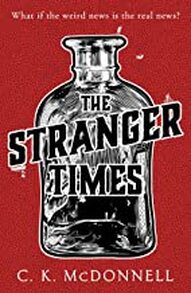 I have been a fan of Caimh (pronounced Keeve) McDonnell’s books since I first stumbled across one about three years ago, so this one took me a little bit by surprise. In a good way, I hasten to add. His earlier works were comedy crime capers set in Dublin, with one of the main characters then relocating to New York, to establish a new ensemble of characters. ‘The Stranger Times’ is a comedy Gothic horror caper, if you can imagine such a thing. If you can’t imagine that, don’t worry, because Caimh McDonnell can. The use of the definite article in the title isn’t a misprint on my part (or Caimh's), because The Stranger Times is a newspaper.  Well, more of a communications channel for the sad, the bad and the mad really, as most of the stuff they publish is hardly “news” unless you are of the tin foil hat persuasion or you believe you are the reincarnation of Cleopatra. That is until Hannah arrives on the scene. Not that she is the cause of the horror, far from it. But the horror story starts when she arrives, coincidentally. Up until now Caimh has set his books either in Dublin or New York (with an excursion to an unnamed American desert location for one title). For this book, however, he has relocated to Manchester. Perhaps that city had more of an air of Gothic Horror about it than Dublin or New York, or maybe Caimh had just visited the city. Who knows? The story is set around two sets of mythical people, the “Founders” and the “Folk”. I can’t tell you any more than that without giving away too much of the plot. Let me just say that one of those two groups are the good guys and the other are the bad guys, with humanity stuck in the middle and paying the price.  But, to cause confusion, you could be married to a member of the Founders or the Folk and not even know it. Hannah is what might be called a ‘trophy wife’ who lived in the lap of luxury until she could put up with her husband’s infidelity no longer, at which point she set fire to his house (accidentally, according to her). Now in need of money to live on, Hannah has to get a job and lacking any discernible skill set, the only place that will take her on is The Stranger Times. This introduces us to the lunatic Editor, Vincent Banecroft and the collection of misfits he has for staff. The only apparently sane person working for the newspaper (until Hannah’s arrival) is Grace, the office manager and even she has her quirks.  Two unexplained deaths, one written off as a suicide, gives Banecroft the sniff of a story and his team then set out to track it down. The rest of the book tells us how they go about it and what happens to them when they get on the wrong side of the wrong person (or maybe entity is a better word). As with all of Caimh’s books that I have read, this one is an entertaining, if undemanding, read. It moves along at a nice pace, the language is user friendly, the characters interesting and the plot is believable, if you are the sort of person who is a fan of the horror genre in the first place. This all makes the book ideal poolside fare if you are planning a holiday this year (You should be so lucky). In terms of the horror content, it isn’t going to keep you awake at night and in terms the comedy content it is probably best to call it amusing rather than rib tickling, which is why I have given it 4 stars rather than 5. But, for a light summer’s read, I recommend “The Stranger Times” by Caimh McDonnell and if you would like to find out more about it, just click on the cover image at the top of the blog. If you have enjoyed this blog and would like to be alerted when the next one is posted, just sign up to our newsletter, which will also keep you abreast of our new titles and our free offers. Spoiler alert, next week's blog is going to be a fiendishly difficult literary quiz. Would you like to be a guest reviewer for the Selfishgenie Publishing blog? Contact us with details of the book you'd like to review. Just three rules:
 Monday 19th July is “Freedom Day” for us Brits as the final (?) Covid restrictions are lifted so we can return to “normal” once again. OK, not quite all restrictions; there are still plenty of confusing rules about foreign travel and what you need to do in terms of testing and self-isolation, but aside from that, the rules are being lifted. I put ‘normal’ in quotes because what is normal for me may not be normal for you and vice versa. That’s the problem with normal – it isn’t normal for everyone. And with some confusion around what we should be doing, what we can legally do and what the government is advising us to do it is likely that there are going to be many versions of ‘normal’.  I’m not going to comment on the wisdom of the decision to lift restrictions as I’m not an expert in virology or the management of pandemics. I understand the arguments for and against, but that doesn’t mean I’m best placed to judge whatever decisions have been reached. I know there are economic benefits to be gained from the decision and I know there are health risks. I’m a big boy now and capable of managing the risks for myself, so I don’t need the government to treat me like a baby and tell me what to do all the time. If I don’t know by now what sensible behaviour is in relation to this virus, then it’s unlikely that I ever will. But I also wish that the same could be said of everyone.  But this moment provides an opportunity to reflect on how my life has been affected over the past 18 months and how it has changed – if at all. It is a strange thing about humans, but as soon as you tell us we can’t do something, we all want to do that very thing. I have had conversations with people who complained about not being allowed to go to a pub, knowing full well that they hadn’t set foot inside a pub for years. The same applied to people who hadn’t set foot inside a gym for years (if ever) as well. When I explained to one acquaintance that it was possible to exercise in your own home, I was told it wasn’t the same as there was no one there to motivate you.  I have no idea what gyms she went to (none I suspect), but I have never been to a gym where anyone ever came along and tried to motivate me. If you attend classes with a fitness trainer at the front, that is different. But if you go to a gym just to use the equipment then you are very much on your own, motivation-wise. Personally, I found Joe Wicks quite capable of motivating me while I remained in my own living room. In terms of my own life, very little changed. I’m an author. I spend hours everyday in my office (my wife calls it the ‘front bedroom’) tapping away on a keyboard. That didn’t change. I also spend a lot of time reading, for pleasure and for research. That also didn’t change. I am also a publisher, so I spend a lot of time reading and editing the work of other authors and marketing our books. That, too, didn’t change. So, on 19th July, a lot of my life isn’t going to change back to what it was before, because it didn’t change when the pandemic started anyway.  I realise that I’m not typical of the great British public. Many people’s lives changed in big ways during the pandemic and they will continue to feel the impact of those changes for a long time after the 19th. For some it provided opportunities, for others it imposed restrictions. For some it provided a stimulus for change and for others it placed them in a sort of prison and for some it meant the tragic loss of a loved one. We all live different lives and, consequently, we were all affected in different ways. There were things I missed in my life. There were the big, family things, like not being able to visit my family and see my grandchildren. Some were able to come and stand outside the front door while we exchanged news, but you would hardly call that a ‘family get-together’. It has made me more determined to see them more frequently. I’m not sure if that is good news for them or not. I missed not being able to play golf for several months at a stretch. I’m not a very good golfer, but it forms an important part of my social life. Not being able to go around a golf course and enjoy the sort of chit-chat that golfers indulge in left a bigger hole in my life than I expected. Even on the wet, cold days, when I wouldn’t normally have played, I found myself staring wistfully out of the window wishing I could go out and play a few holes in good company.  I missed not being able to go to watch my local rugby team play. For 8 months of the year my weekends are dominated by the sport and not being able to go along to Franklins Gardens to watch Northampton Saints play was, perhaps, the largest inconvenience after not being able to see my family. It was even worse when the clubs weren’t even allowed to play the sport and we had to make do with watching re-runs of previous seasons’ games on YouTube. Sport actually forced a change in my behaviour. When the rugby re-started, but fans couldn’t attend matches, I finally bit the bullet and took out a subscription with a streaming service so that I could follow my team’s progress live on TV. Having done that, I had to get value for my money, so I watched a whole load of other matches being contested by rival clubs. So I’m now watching far more rugby than ever before. Well, not at the moment because the club season has ended, but I’ll be maintaining my subscription for the new season so my weekends will now be even more dominated by rugby.  Last year we had to cancel three holidays, one to Prague, one to Spain and one to Croatia. Only one of those was I really disappointed about, because the Spain trip was to visit my sister, who lives there. I don’t see a great deal of her because of the distance, so to have that taken away was a bit emotional. But the other two trips I felt no sense of loss over. They were for pleasure – a nice break from routine – but they held no emotional context so there was no sense of loss. We’ll head off there at some point, when we get around to it, but this year we’re actually booked to go somewhere else and hopefully we’ll be allowed to do so. But if we aren’t, it won’t be a tragedy. Besides, even if we have to self-isolate on our return, that won't be a big deal (see above for reasons why).  To the outsider, perhaps to you, it may make you think that my life is boring. Well, for you it may be, but for me it has all I want and need. I am a man of simple pleasures. I have my work, I can see my family, I can play golf and I will be able to watch rugby when the new season starts. My health is pretty good (for my age) and I’ve had both my jabs, so I’m quite well protected against Covid unless a jab resistant variant turns up (which is a possibility). All being well we will be able to travel abroad this year. I don’t need anything more than that. Not really. If you have enjoyed this blog or found it informative, or you want to keep up with our future publications, just click the button below to sign up for our newsletter. Go on - you know you want to! Has Some Of Our Technology Been Predicted By Clairvoyants?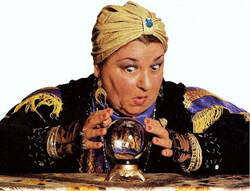 As a Sci-Fi author with a background in technology (OK, I’ll own up, it was the technology of the 60s and 70s), I get rather annoyed when claims are made that someone must have been a clairvoyant, because they foresaw such and such a technological development. Perhaps they weren’t a clairvoyant, perhaps they were just (a) observant and/or (b) imaginative. The problem for those people was that they could think creatively and imaginatively, but they didn’t have the technology available to turn their creativity into a reality. I’ll give you an example. Jules Verne published his book “The First Men In The Moon” in 1901, which featured space travel. So, was he a clairvoyant, or was he just able to imagine rocket ships?  Author Jules Verne - not clairvoyant Author Jules Verne - not clairvoyant The technology which enabled space travel didn’t start development until the late 1930s and didn’t become a reality until the 1940s. After that it accelerated to the point where humankind really did go to the Moon and continues to travel into space to this day. Was Verne a clairvoyant? No. he just knew that if flight was possible, it must surely follow that man would eventually find a way to travel outside the Earth’s atmosphere. Gas filled and hot air balloons had been around since 1783. Gliders had been around since George Cayley flew the first in 1853 and the Wright brothers’ maiden flight, lasting 3 seconds, took place in 1903. So lots of people were thinking about flight and to what it might lead. Mother Shipton is often credited with being a clairvoyant or seer for some of the things she “predicted”.  Mother Shipton - but probably not. Mother Shipton - but probably not. For those of you that don’t know of her, Mother Shipton was a witch, wise woman, seer, clairvoyant, all or none of those things who lived in Yorkshire (or may be entirely fictional) from the late 15th to the mid 16th centuries. She is credited with making many predictions. The first thing to know is that the first book of her predictions, the only evidence that they were ever made, didn’t appear until 1641, 80 years after her death and some of the language used is incorrect for her lifetime, using words that weren’t coined until later. Even the picture used to accompany this blog is a fake. The hat isn’t from the Tudor period, it is much later. This book “predicted” events that took place either during Mother Shipton’s lifetime or after her death but before the book was published. One prediction that is claimed for her was the dissolution of the monasteries, which started in 1531and the marriage of Henry VIII to Ann Boleyn (1533). She didn’t die until 1562 and the book didn’t appear until 1641, so you can draw your own conclusions.  Charles Hindley Charles Hindley The second thing to know is that the epic poem credited to her that makes most of the predictions about the future is an established fake. It appeared in 1862 in a new edition of the book of Mother Shipton’s predictions and the author of the fake was Charles Hindley, who confessed to his act 10 years later. He was the book’s editor. Yet many people still believe that Mother Shipton was the author of both the original book and the forged poem. OK, but the predictions made in the fake were still remarkable, or so it is claimed. They include women wearing trousers, the horseless carriage and submarines. It also predicts three world wars. The first women to wear trousers in Britain did so in the 1850s, as an early act of feminism. The word “bloomers” stems from then and was first used to describe a type of Turkish or Arabic style of pants worn by Emily Bloomer. They apparently scandalised Victorian Society.  A replica of the Turtle based on the original drawings. A replica of the Turtle based on the original drawings. Predicting wars is always a safe bet. Britain has been involved in many of them, the most recent at the time having been the Crimean War (1853-56) but the Napoleonic Wars, which were in effect global as they affected overseas empires, only ended in 1815 – within living memory for some. One of the claims is that the poem predicted the submarine. No it didn’t. The first submarine had been tried out in 1690 and the first military submarine, the Turtle, had been tried out by the Americans in 1776. The publication of the fake was after the Great Exhibition, which had been held in Hyde Park in 1851. It was held inside a great glass building (the Crystal Palace), which was also “predicted” in the fake poem but, more importantly, the exhibition featured many of the innovations mentioned in the poem as well as stimulating discussion about rafts of new technology, some of which became a reality within that century or at the beginning of the 20th century.  The Crystal Palace -original built in Hyde Park, London, before being moved, then destroyed by fire in 1936 The Crystal Palace -original built in Hyde Park, London, before being moved, then destroyed by fire in 1936 It is likely that the Great Exhibition galvanised research into new technology, enabling what would follow and it also allowed Hindley to create his “predictions” for Mother Shipton. So, Mother Shipton didn’t actually predict much (if anything) and Hindley didn’t predict much either. But he did have a bit of an imagination. Because it is imagination, not prediction, that stimulates innovation. The mathematics on which we build our science and engineering started out in Ancient Egypt, Babylon and Greece, with people like Archimedes, Pythagoras and Euclid. Once you have mastered the mathematics, turning an idea into a reality is all down to the availability of the technology. 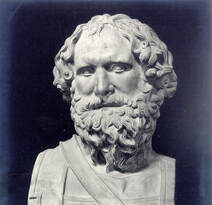 Archimedes Archimedes We are well aware of what ancient civilisations created using the technology of their day. They certainly understood a lot of about the mathematics of mechanical engineering. “Give me a lever long enough and a fulcrum on which to place it and I will move the world” is a quote attributed to Archimedes, who lived in the 3rd century BC. And one of the Seven Wonders of the ancient world were the pyramids, the building of which would have been impossible without a sound understanding of mathematics. Who knows how much further the ancients would have been able to get had they been able to unravel the mysteries of organic chemistry and electricity? The story goes that James Watt (1736-1819) was sitting in his kitchen watching his kettle come to the boil when he saw that the steam from the kettle had the power to raise the kettle’s lid. The idea came to him that if he could build a big enough kettle, he could make steam do much greater amounts of work. The idea was one of the great driving forces of the industrial revolution. All Watt needed was the technology to build his bigger kettle - and that was available in his day. So Watt isn’t described as a clairvoyant, he is described as an inventor and engineer.  Inventor and Engineer James Watt Inventor and Engineer James Watt There we have it. Your “clairvoyant” or “seer”, is my inventor who lacked the technology to turn their idea into a reality. They couldn’t see into the future, but they could have ideas about ways their world could be changed or improved. In the late 19th century the vast majority of humanity couldn’t imagine humankind travelling to the Moon, but Jules Verne could. Others came behind him to turn his imagination into a reality and they may even have been inspired by his book to make the attempt. As Sir Isaac Newton said in 1865, when complimented on his developments in mathematics by Robert Hooke, “If I have seen further, it is by standing on the shoulders of Giants”. And so it is with authors. Authors have an imagination. If they didn’t, they wouldn’t be able to write their stories. 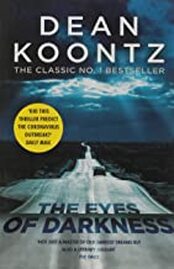 It has been claimed that some authors have “predicted” the Covid-19 pandemic. No, they haven’t (“The Eyes Of Darkness” by Dean Koontz is one that is cited). Those authors have taken what they know about historical outbreaks of diseases and linked it to knowledge of modern scientific research into viruses and used that to create an imaginary pandemic. In fact Koontz’s virus doesn’t cause a pandemic, it causes a child to become psychic, but that isn’t explained by the people who cite the book as a “prediction”. The fact that any book uses a pandemic caused by a rogue virus that spreads quickly isn’t a prediction, it is a knowledge of history: a knowledge of the spread of the Black Death, of hantavirus, of yellow fever, typhoid, typhus, polio, cholera and, one of the biggest up until now, influenza. They didn’t even have to imagine the most common symptoms of Covid-19, because they could borrow most of those from Spanish Flu, Swine Flu and Bird Flu, the latter two both being caused by the SARS virus, of which Covid-19 is also a strain. Add the words “biological warfare” and/or “rogue government” to the mix, exaggerate the severity of the illness and you have a good sci-fi plot in the making. As for most other sci-fi, some of what was “predicted” has happened.  The classic Star Trek communicator The classic Star Trek communicator The communicators used in the first series of Star Trek are no more than our modern mobile phones. And no, they weren’t a prediction. Research had already started into portable telecommunications systems small enough to fit into a pocket. It just took a few more years for the technology to arrive that turned the research into a reality and the technology came out of projects that were already running – the American and Russian space programmes. And those programmes came out of the Second World War secret weapons developed by the Nazis. Modern super computers came out of the work of the code breakers at Bletchley Park in World War II and they borrowed heavily from the work of Charles Babbage (1791 – 1871) and other pioneers. So, have you had a great idea for something that we could do with around here but don’t presently have because of a lack of technology? Write it into the plot of a book and you could be hailed as a clairvoyant. While someone else will take your idea and start on the hard work of developing the technology to make it happen. Some things we still aren’t so sure about, of course. Faster than light travel, for example, which we would need for deep space exploration, is not thought to be possible. But several writers have predicted it (including me). But first we’ve got to get past all that messy e=mc squared stuff. If you have enjoyed this blog and/or found it informative, be sure not to miss any future posts by signing up for our newsletter. Just click the button below. We promise not to spam you and you can unsubscribe at any time.  Here at Selfishgenie Publishing we use social media as a marketing tool. If you read our series of blogs on the subject (still available in the archive) you will see that it is cheap and quite effective if used well. However, there is a darker side to social media marketing and people are falling for it every day. Actually, there are two dark sides. The first is dark, the second is very dark. The plain dark is the way social media is used to capture your personal data, which is then sold to third parties so they can bombard you with advertising. We’re not talking about the usual clicking of the “agree” button for terms and conditions. That is just the way that social media sites make money by letting you use their platforms for free. If you don’t agree, you can’t use the platform. Seemples. 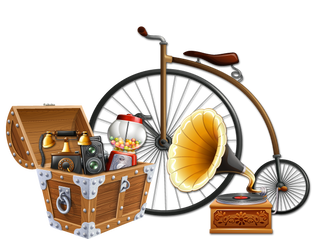 No, we mean the way memes are used to capture data. You may think it’s just a fun question for you to answer, but it isn’t. It is aimed at grabbing a little snippet of personal data from you that will be of use to someone in targeting their adverts. Not only that, but you even give them the address to which they can send the advert. I’ll give you an example. One meme that appears quite regularly is “Name something from your childhood that young people today wouldn’t understand.” Sounds harmless, doesn’t it? Just a bit of fun. But your answer puts you firmly into a specific age bracket. That tiny scrap of data can then be used to target you for adverts aimed at your age group. If you happen to be our age, it might be stairlifts, funeral plans or walk-in bathtubs.  And how do they get your address? It’s your social media username, which shows up every time you reply to one of these posts. That gives them access to your profile as well, which probably provides them with even more personal data. It also tells the person that posted the meme something else about you. It tells them you were gullible enough to respond to the meme. And if you were gullible enough to do that, you may be gullible enough to fall for an advert for a substandard, or even non-existent, product.  Other age-related questions are based around subjects such as music (a song or band name can give away the decade when you were a teenager), films, books, TV shows, the car in which you learnt to drive etc. So, what is the “very dark” side of these memes. It relates to cybercrime. It’s the questions that are aimed at trying to get hold of your passwords so that your accounts can be hacked. You may think I mean your bank accounts, Paypal etc, but I don’t. I mean your social media accounts, because many of these are used as the basis for scams of one sort or another. "You may think that none of your friends would be stupid enough to fall for a scam"  If I can make myself appear to be you, by posting on one of your social media accounts, then your friends may trust what has been posted. It also allows me to access the list of all your social media friends, which I can sell. You may think that none of your friends would be stupid enough to fall for a scam, but hundreds of thousands of people across the world, good, honest and above all intelligent people, have fallen for these scams. It only needs one of your hundreds of social media friends to fall victim for the scammer to win. So those sorts of posts will ask you about your first car, your first pet, your first school and a whole lot of similar things because those are the sorts of things that are used as passwords or as the answers to security questions. These also include you “pornstar” or “stripper” names, or even your secret agent name. eg “The last thing you ate and the name of your first pet is your secret agent name.” You wouldn’t tell someone your account number and password for your bank account, but you are happy to tell them the name of your first pet – which is almost as revealing. There are other ways of getting the account number and password, you’re just making things a bit easier for them when they try to hack your account, by providing the answers to the security questions or memorable information  So, other than the age-related memes, what others should you be on the lookout for? The most obvious ones are worded like this. “You are about to be attacked by a zombie. The last thing you bought is the weapon you must use to fight it. What will you use?” That’s quite an easy one to identify, because it relates directly to products. If you bought the thing you are going to use against this hypothetical zombie, then you’re likely to buy more of the same. How about this one. “It’s your best friend’s birthday today. The nearest thing to your right hand is what you will be giving them as a birthday present. What will they get?” Again, this is product related, because whatever you answer can then be used to target you for similar products. If you say “a plate of biscuits”, then you’ll be targeted for biscuit advertising (or, more likely, sweet things in general). You may also become a target for advertising for plus sized clothing or dieting aids.  An answer related to smoking products may result in you being targeted for nicotine replacement therapies, books on how to stop smoking or drugs to help you stop smoking (which may or may not work and may even be harmful to your health). OK, how about something a little bit different. “The last place you visited is where you will spend your honeymoon. Where will you go?” Whatever your answer, you will be targeted for advertising for similar destinations, cheap airline seats, hotels, etc. Now, if you don’t mind being targeted for advertising, then there’s nothing wrong with any of this. But if you’d rather spend your social media time actually socialising, rather than scrolling through adverts, you might do well to avoid responding to those memes.  You may think that your “advertising preferences”, which you have carefully selected on your favourite social media sites, will protect you against these adverts. You would be wrong. These simply tell the site’s owners (Facebook, Twitter, Insta et al) who they can direct adverts for certain products towards in order to maximise the number of clicks for the advertisers. They won’t prevent you from seeing advertising from other sources that are paying those same sites to “boost” a post or whatever term the site uses. Believe it or not, there is no way that you can actually prevent advertising from appearing on your social media pages. All you can do is tell the sites which products you’re not too unhappy seeing. You’ll see all the others anyway because they’re paying the social media site to blast the adverts out to anyone who has an account. But giving away your little bits of data allows those “blast it out” type of advertisers to refine their audience by targeting you personally, by age, gender, interests, purchasing habits, cultural tastes etc  And, when you ask yourself “How did they know that about me?”, the answer will be “Because you told them.” Many of the products will be genuine but remember what we said about targeting the gullible. That’s how scams work, because they’ll try to get your money by selling products they have no intention of ever delivering. How do you know they actually own that holiday cottage or Spanish villa they are offering to rent you? They will also try to sell you products which may not conform to safety standards. You have no idea where the sellers of the products may be based, so you have no way of finding out if they are reputable. There are ways of countering this form of data snatching and that is to tell lies. If the data that is captured is inaccurate it becomes useless, because the advertiser is directing their adverts towards people who won’t buy their product or service (whether it’s real or a fake). That means they are wasting their money and will have to find some other way of identifying their target audience. They will find that way, of course, but there’s no need for you to collaborate with them in their search. “Does this tell somebody something about me that they didn’t, or couldn’t, otherwise know?”  There is one thing we can all do when we read these memes. It is to ask ourselves one simple question: “Does this tell somebody something about me that they didn’t, or couldn’t, otherwise know?” If the answer is yes, you are making an informed choice about whether or not to post your answer. You don’t have to. It isn’t compulsory. And if you choose not to answer, you will reduce the amount of advertising (real or scam) that appears on your social media feeds. For the darker forms of data capture, the ones that are aimed at finding out the answers to security questions, then the questions is much simpler. “If I answer this question, could it compromise the security of any of my accounts?” Again, telling lies in answer to the questions makes the information useless and it will frustrate the scammers, which is actually a result for us good guys. One thing of which we can be sure is that the people who post these memes aren’t acting in your best interests. If they were, they wouldn’t be hiding behind fake user IDs and asking seemingly innocent questions in order to grab your personal data. It’s up to you whether you co-operate with them, but we recommend you don’t. If you have enjoyed reading this blog, or found it informative, why not make sure you don't miss future editions by signing up for our newsletter. We promise not to spam you, or to sell your data to scammers. Just click on the button below. |
AuthorThis blog is compiled and curated by the Selfishgenie publishing team. Archives
March 2025
|

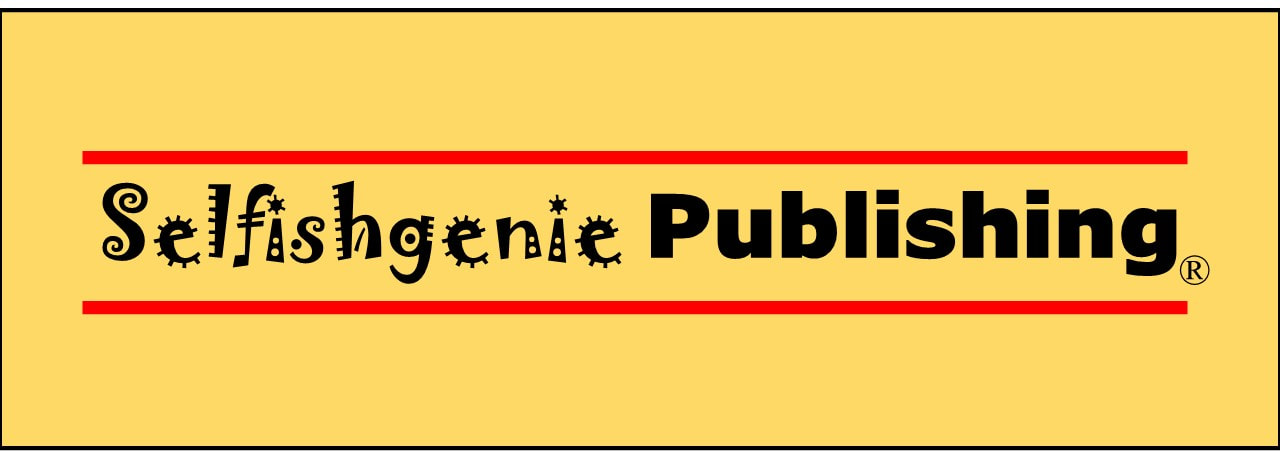

 RSS Feed
RSS Feed